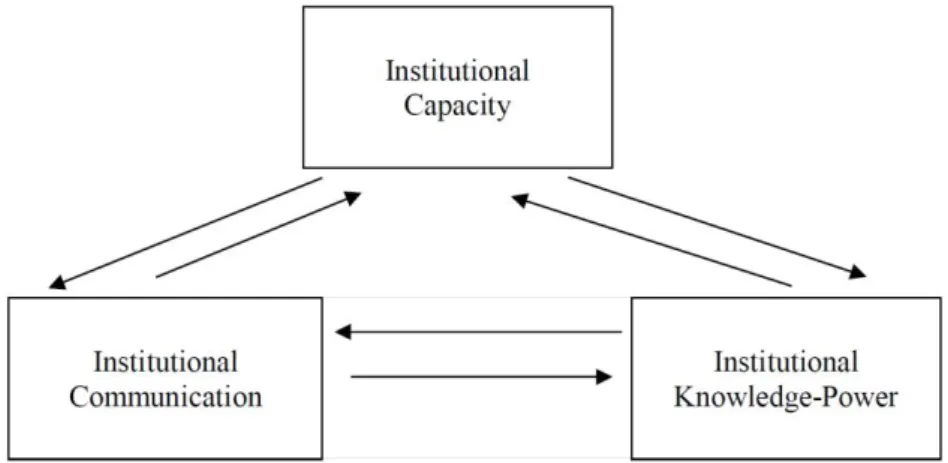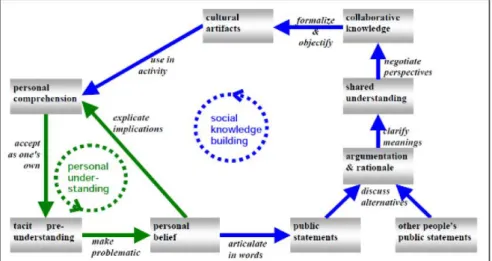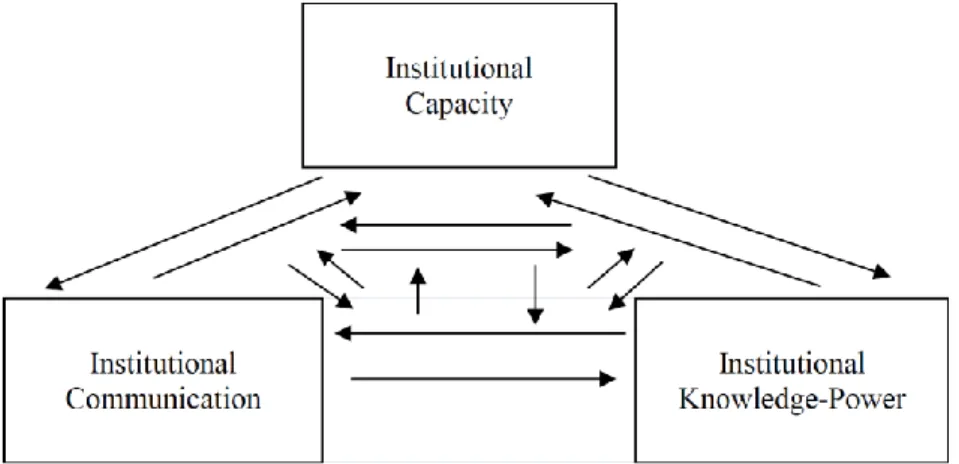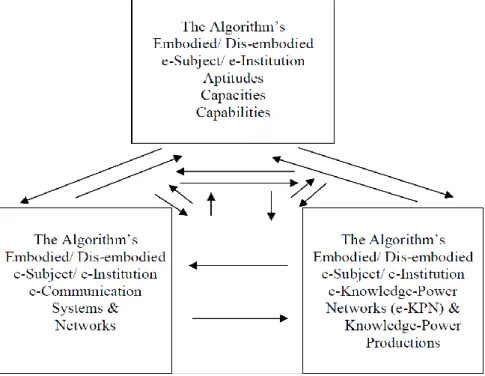Firstly, the article develops Michel Foucault's relational explanation of the subjective embodied capacity – subjective embodied communication – subjective embodied knowledge-power-production triad (cf. Smit & Chetty in terms of the triad's 'external instruments', laws, structures, ideologies and institutions ., as it is relevant in the African context today, from a Digital Humanities perspective. It is in the interests of the purposeful purposes of 'the production and transformation of knowledge, articulated with empirical, evidence-based, contextually relevant research-led teaching and learning.” From this perspective, and in the absence of the required knowledge-production approaches, through its non-involvement, much in Southern African academia remains gloomy and barren.
Second, and staying with this theme of the Knowledge-Power Block (KPB), we believe that we need to think about its relationship with communication and adapt Foucault's notion of the 'block' to that of the network, i.e. . For this, we need a clear understanding of the notion of 'contextual relevance'. In our estimation, and particularly for ADH, Sperber and Wilson's theorizing of significance has, so far, merely opened up the field of questions, not only about the subject, but also about the electronic subject and electronic interpretation. communities, in e-communication – relational knowledge-power networks of the digital age.
In the first place, and to complement Foucault, we must add to the explanation of the subject in terms of body and institution the digital, electronic algorithm or, as it has recently come to be known, the algorithm. 5 For now, we can also only mention that the notion of 'relationships' can also be thought of in terms of Sperber and Wilson's notion of relevance, as a principle of digital relevance, or e-relevance of relationships of relationships of -capacity – e-communication – e-knowledge-power. However, the dawn of e-subject, e-communication and e-knowledge-power networks, precisely through their instabilities and changing systems, opened up a host of possibilities for e-Humanities and e-Humanities.
With regard to the practice of a transformative, and transformed, contextually relevant knowledge production, the dawn of the algorithm offers immense possibilities and opportunities, for not only personal knowledge and development6, but also knowledge production in the e-Humanities more broadly. talk.

2 Knowledge Building Processes
However, it also offers us opportunities to re-process rejected stable (and archived) knowledge productions from the past – when they are digitized – to still see if there is anything still useful, ie. In this endeavor, AI has already proven extremely useful, going back to studying the history of our ecological systems and humanity's oldest biochemical algorithms. As we create a new world or a new Africa with knowledge power and human and ecological value, reclaiming the old knowledge dump, whether from the colonial era or long before, is only part of the challenge.
And, we would also like to suggest, that this also means that one should seek connection, but not be forced into systems of knowledge power that do not serve the well-being of the people of the African continent, be it the US, EU (included or excluded, however, the question must remain, of the usefulness for development, and the scope, spread and range of such knowledge power systems, in relation to what serves the human and ecological well-being of the planet, regardless by race, class, gender or any other social generative system. Thinking from the perspective of the subject, it includes opportunities and opportunities for self and social advancement, through the development of personal capacities and skills, and an alliance with and active involvement in - knowledge-power networks.
This includes, and may even escalate, the physical movement and study of young students and knowledge-powered entrepreneurs from the African continent to as many on-site parts of the world as possible. Conversely, the focus is also on acquiring knowledge and developing the latest skills, capabilities, capabilities and aptitudes, internationally, for local implementation and use. That is why it remains very important that young students from Africa continue to study on-site in as many countries as possible.
And, fifth, an image of intercontinental connectivity, as produced by Parag Khanna, of the Instituto per Gli Studi di Politica Intrernazionale, Rome, October 31, 2018. In the vision of Parag Khanna, expert in international relations and author of the best - sale of Connectography: Mapping the Future of Global Civilization, connection creates a reality beyond the state. First, we copy a post from 2013 at the African Studies Association's annual meeting in Baltimore, where disciplines from History and Anthropology to Public Health and Geography reflected on the processes and procedures of developing and incorporating the most visible digital in that time. humanities.
Second, we copy Roopika Risam and Kelly Baker Josephs' call for contributions for their April 2017 book The Digital Black Atlantic, currently in production, in the University of Minnesota Press's Digital Humanities Series. It was the theme of the European Summer University for the Digital Humanities in Leipzig in 2017. The National Endowment of the Humanities (NEH), Office for the Digital Humanities, has announced 31 Office for the Digital Humanities grants for 2017 to advance research into their Digital Humanities Program and more specifically the Institutes for advanced topics in the digital humanities program.
Importantly, it shows that 31 of the 245 grants awarded in 2017 were dedicated to the digitally integrated aspects of these projects. The sixth image is the second from the Office for Digital Humanities and represents all 31 projects that received grants in 2017.

Conclusion
We have also sought to record the ugly truth of the lingering effects of apartheid and colonizing blocs and knowledge formations. This is what has happened, for example in the #Rhodesmustfall and #Feesmustfall movements, among many others. We think that in order to think about the concerns of these movements, as they arise from embodied intellectual experiences, and as they relate to the epistemologies of the sciences, particularly the human sciences, our theorizing and Foucault-related modeling can provide a prospect to be treated. these.
We also think that, as one of the best theorized systems, the notion of. We think that connecting it in an interdisciplinary space with Foucault's theorizing can be useful, for purposes of knowledge production, in the constructivist theoretical framework. Finally, we sought to articulate Foucault's triadic model, from the perspective of the subject, in the framework of digital production, e-communication and, consequently, e-knowledge-power.
On the one hand, we have done this in view of Castell's emphasis on the fact that, in our argument, national values, as enshrined in our Constitution and Bill of Rights, must find material expression and realization in our institutions, and hence in their shaping of the society. As such, and since Foucault did not separate the subject from the setting, but populates the settings, and is effected or influenced by the settings, we must think of the subject/setting in the same way as it is articulated. as a combined 'unity', both in the different uses and effects of the communication networks and in the way it produces knowledge power in the knowledge power networks (KPNs), with their many effects, it forms. On the other hand, we should think through the same system in terms of the digital age, digital knowledge-power (social) formations and ultimately the algorithm, to which we are all increasingly exposed.
In this focus, and by making good use of Foucault's understanding in terms of the myriad opportunities and challenges we face, not least in relation to the dawn of the algorithm, we believe that through collective cooperation, humanity can enter an era of better governance not only of ourselves and the inhabitants of the world, but also with our environment. And with all the new and innovative technologies or "instruments", we will be better prepared and endowed to do this through critical-constructive problematizations and contextually relevant production and transformation. As such, we will need to pay attention to the macro-, meso- and microphysics of the power of knowledge and its impacts, not only on improving the quality of life and well-being of humanity, but also on our planet as a whole.
And, in relation to the labor challenges we face, we believe that the Digital Humanities, or e-Humanities, and e-humans, in collaboration with capital, our companies and industries, can play another critical role.
Available at: https://www.csuohio.edu/news/advancing- innovation-in-digital-humanities (Accessed 21 October 2017.). Engaging in the knowledge economy: regional patterns of content creation with a focus on sub-Saharan Africa.

